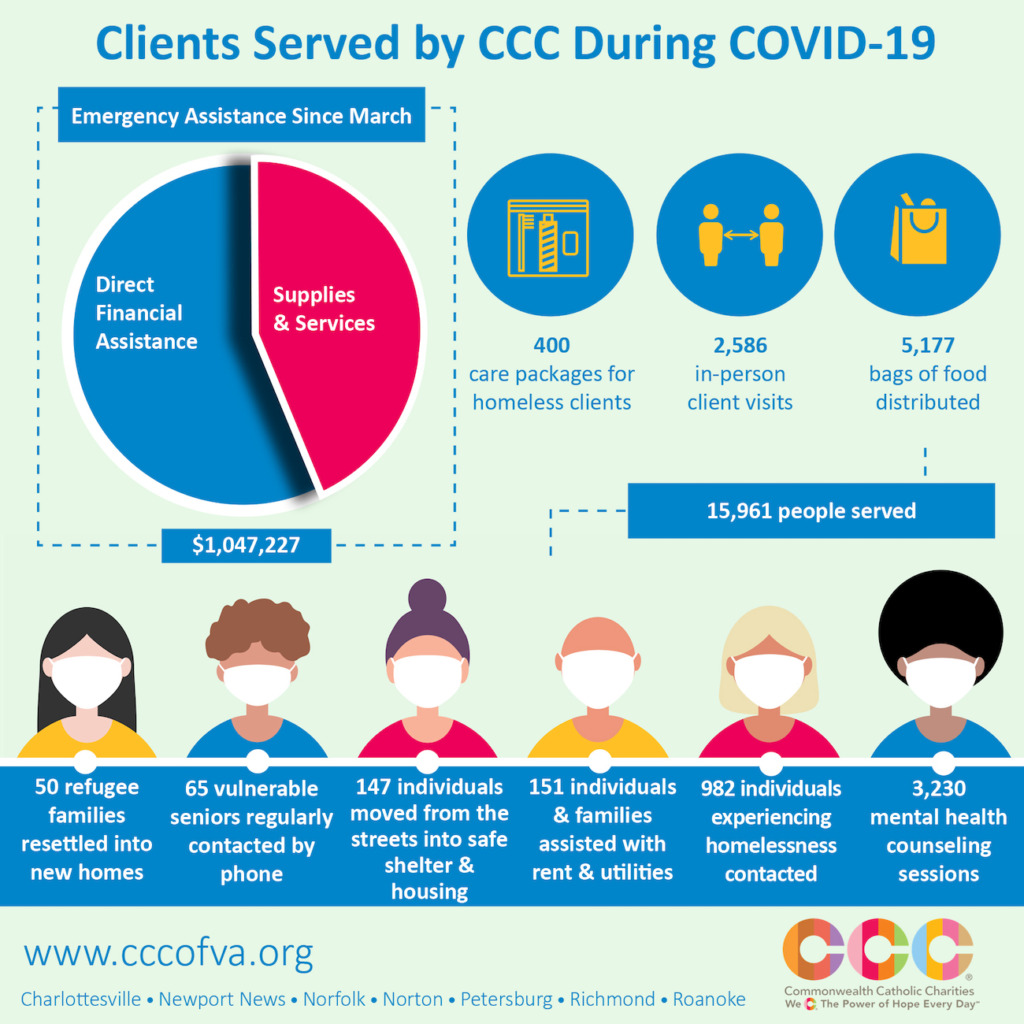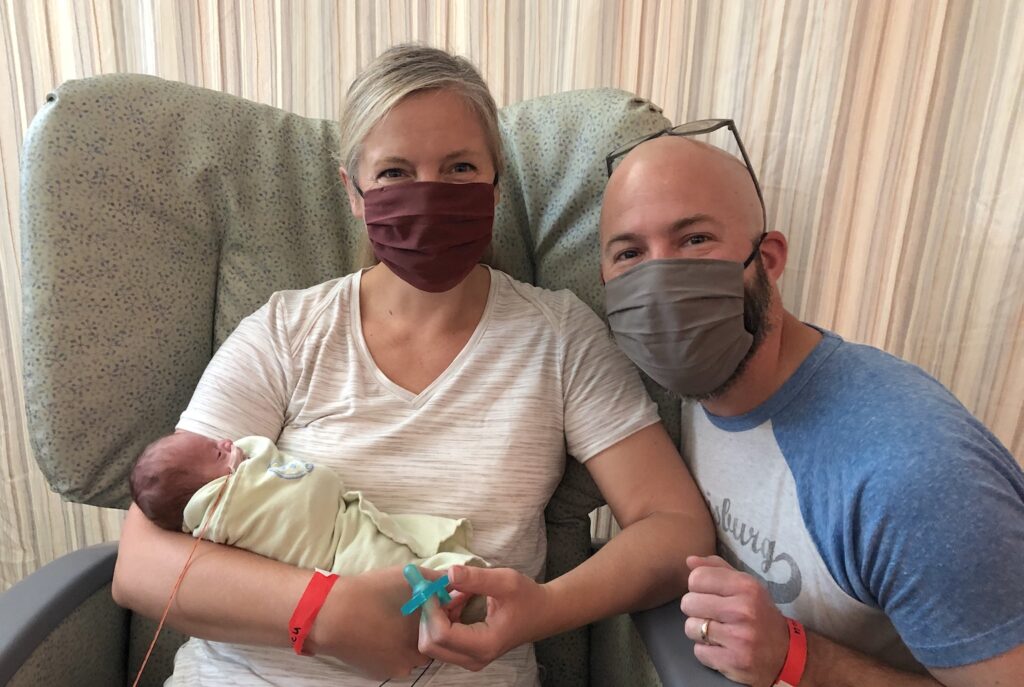Continues to provide regular services in addition to emergency aid
Editor’s note: During the first four months of the pandemic, Commonwealth Catholic Charities provided $1 million in emergency assistance. In addition, CCC continued to assist people through its other services, e.g., adoptions, counseling and outreach to homebound seniors.
Sara would pause at St. Benedict Church, Richmond, in front of a statue of the Mother of God during her morning walks with her dogs. She would pray for peace, hope and the day when she, too, would become a mother.
Sara and her husband Ryan couldn’t have biological children, so they decided to adopt. They met with many adoption agencies and advocates; they also communicated with dozens of people who ended up being scammers looking to profit from their dream of a family, promising a baby that would never be delivered.
Through all the heartbreak, Sara still paused and prayed to Mary.
“We never lost hope,” Ryan said, “but there were some days we were hanging on by a really thin thread.”
They finally ended up with Donna Banks, part of the Adoption and Pregnancy Counseling team with Commonwealth Catholic Charities, whom they had talked to the previous year.
“Donna left a lasting impression,” said Sara. “She was like one of the fairy godmothers – a tiny, little, quirky, vibrant woman full of compassion. We felt like she was a true advocate and very genuine.
It didn’t feel like just a transaction like the others.” It didn’t take long for Banks to find them a birth mother in search of parents for the girl she was carrying. Learning they were chosen, Sara and Ryan bought furniture and toys. They washed clothes and bottles. They set up a nursery. Two days after giving birth, the biological mother changed her mind and decided to keep the child.
This was at the beginning of COVID quarantine. Sara and Ryan were trapped in their home with a nursery constantly reminding them it was missing a baby. Eventually, Ryan packed the items into boxes and kept them out of sight.
But they kept trying. So did Banks.
She has been working in adoption for decades and was moved by the couple’s tumultuous journey and seemingly endless determination.
“They are very sincere, incredibly resourceful. They are everything you want to see in adoptive parents,” Banks said. “They have the passion. They knew what their mission was, and that was to find their child, and they were going to do it.”
A few months later, they got a call from Banks. A young woman in Roanoke had gone to the doctor thinking she was sick only to find out she was pregnant. The doctors had to do an emergency C-section at 26 weeks. Weighing only 1 pound, 13 ounces, the boy arrived in June. He would stay in the NICU for nearly two months.
“All of our families do a profile book with a picture of them, pictures of their house and a personal letter to the expectant mom,” Donna explained. “As soon as we showed the birth mother Sara and Ryan’s profile book, she immediately fell in love with them. She kept referring to the baby as ‘Sara and Ryan’s baby.’ She connected to them on a very emotional level.”
Ryan and Sara packed their bags and their dogs and headed from Falls Church to Roanoke.
Meeting their baby wasn’t what they had imagined. Their faces were covered with masks; their bodies were covered with gowns; their baby was covered with sensors, wires and tubes.
They could only visit him one at a time, as the hospital had strict rules about not allowing more than one visitor. So Ryan worked while Sara visited Fletcher and Sara worked while Ryan did. It wasn’t until Fletcher was discharged several weeks later that they were able to spend time together as a family.
On August 21, they went home.
“I learned a long time ago that there is nothing random about adoption,” said Banks. “I feel that a successful adoption is when the child is placed, that is where he or she was always meant to be.”

Mark Williford puts on a facemask as he enters Tidewater Tech, where he is studying to become an HVAC technician. He has a roof over his head and food in the pantry.
Looking back a little more than a year ago, Williford’s life today seems like a fantasy. Then, he was living on the streets, moving from city to city. A truck driver by trade, Williford kept falling asleep behind the wheel, a side effect of the pain pills to which he was addicted. He knew he could hurt someone, so he quit — not the drugs, but the job. He didn’t think about the future as his present seemed so bleak.
As a child, he would spend Sundays at church. His grandfather and uncle were preachers. He would go to Sunday service, Bible study and church events.
“At some point I lost faith, and then one thing after another kept happening,” he said. “The pain killers just made me feel better. They numbed me to my reality.”
He was devastated by the loss of his fiancée, who died of cancer. He had moved to Norfolk to help his mom – he is an only child – and felt the pressure mounting, which led to increased depression. And there was his sciatica.
Originally prescribed opioids for back pain, he started buying them on the street and eventually became dependent.
For a year and a half, Williford was homeless. He became suicidal. One day he called an ambulance for himself to take him to a hospital where he stayed in the psychiatric ward. He joined a drug rehab group at his shelter, which led him to CCC and case worker Michele Gooden.
“Michele has been a guardian angel for me,” Williford said. “She’s given me bus passes, food, furniture, electricity, everything. She has helped me get back to where I needed to be. She’s been a lifeline.”
One thing that motivates Gooden is that so many people are just a paycheck away from being homeless, especially when millions have lost their jobs due to COVID-19.
“I hate to see my fellow man in the position they are in. It could be me, it could be my son, it could be anyone. It’s all about humanity, empathy,” she said.
Gooden explained that one of the main goals of the Supportive Housing and Homeless Services program is to get clients Section 8 housing and the tools they need to become productive members of society.
Williford was recently approved for Section 8 housing, where waitlists are growing, funding is not, and approvals are few.
Gooden offers rides to the food pantry or store. She calls weekly just to check up. She gives clients resources on housing and bill assistance, counseling, education and more.
“I just do what I have to do. I ask the Lord for guidance and I let go. And it’s been working for me,” she said.
Williford is at the top of his class. After getting his HVAC certification, he wants to earn his college degree and eventually run his own HVAC business.
Meanwhile, he takes care of his mother, who had a stroke earlier this year, during the day and studies at night. He tries to help people as much as he can. If he sees someone he knows from his time on the street – or even someone he doesn’t – he offers them socks, deodorant, a snack. Small acts of kindness that he knows can make a big difference.
He hopes his story will inspire others to seek help and change their lives.
“I wake up smiling every morning because of how life has turned out,” Williford said. “I’m just blessed. I’m too blessed to be stressed. I’m trying to be somebody so I can pay it forward and help other people.”
COVID has hit the elderly hard — not just because they are vulnerable to the disease, but because they are vulnerable to loneliness.
Many elderly were already isolated because of a deceased spouse or children who live out of town. Some could no longer drive or see well and were homebound. Whatever interactions they have almost disappeared with COVID.
Through its Independence for Seniors program, CCC calls elderly people two to three times a week just to check up on them, talk to them, give them a connection. One of them is 99-year-old Alma Bailey.
Bailey lives alone in Roanoke. Her husband died several years ago, and her daughter died unexpectedly last year. She has no family in the area. Her son in Norfolk and granddaughter in Richmond visit from time to time but haven’t been able to do so because of COVID.
Meals on Wheels delivers food to her house four days a week. One day, Bailey mentioned to the Meals on Wheels delivery man how lonely she had been feeling. He handed her a crumpled piece of paper on which was written the CCC phone number.
“I was used to being alone before COVID. Now it’s worse. But at least I have the phone calls. They’ve all been so wonderful. I feel like I’m not alone in the world,” she said.
Diane Hargraves has been with the program since its inception in 2011 when it had two volunteers and a few clients. Now it has nearly 70 clients and more than a dozen volunteers.
“We talk about faith a lot,” Hargraves said. “I am a person of faith. Faith is such an important anchor for the majority of our clients. For me personally this is a ministry. This is something that I do out of my own faith. I feel God has definitely brought me to this position and to this program. I’m honored to be a part of it. I believe God’s hand is all over it.”
The volunteers call and ask clients about their day, how they’re feeling. They encourage them to keep their doctors’ appointments and to take care of their physical and mental health.
They provide craft supplies, word searches, crossword puzzles and adult coloring books, as well as facemasks and cleaning supplies. Though home visits have decreased due to COVID, the calls have never stopped.
“One of the best gifts we can give people is to truly listen to them,” said Hargraves. “Listen, hear, validate their feelings and the things they’re going through. So many of our clients don’t have anyone who really listens. Some of our clients don’t have anybody. This is priceless.”
According to Hargraves, the pandemic has caused more anxiety for a population already struggling with the anxiety and depression of aging alone. She said the Independence for Seniors program is more important than ever.
Bailey looks forward to the calls.
“The cloudy days are so bad,” she said, “but today the sun is shining.”
Editor’s note: If you or someone you know need assistance, please contact Commonwealth Catholic Charities at 804.285.5900.

